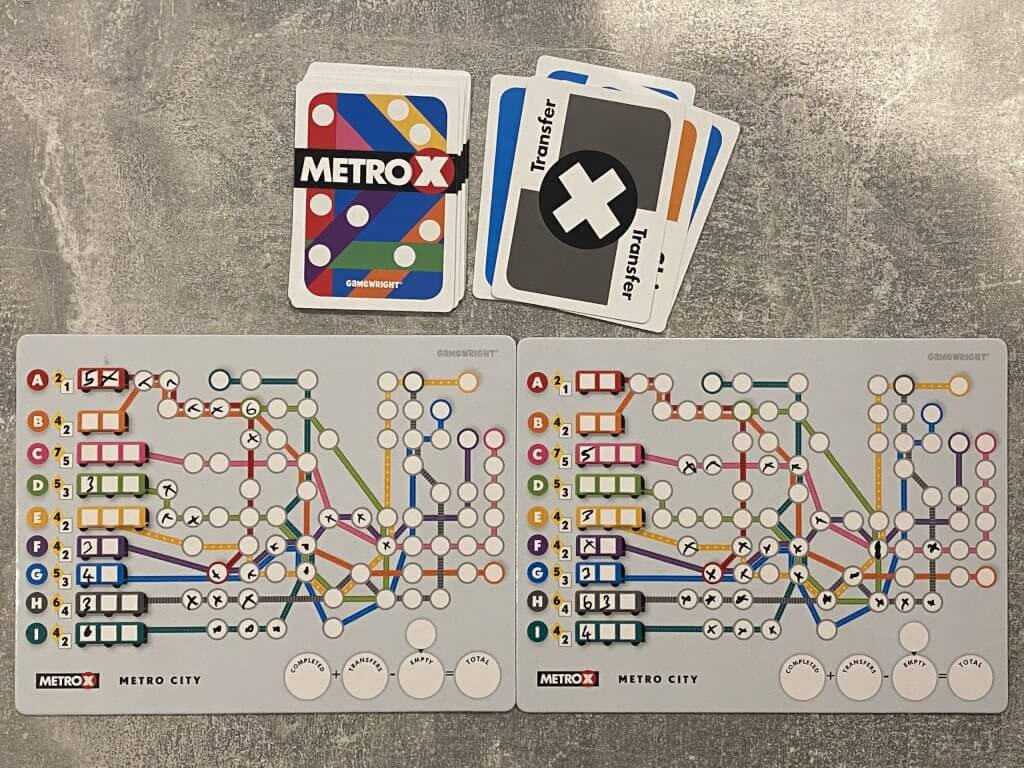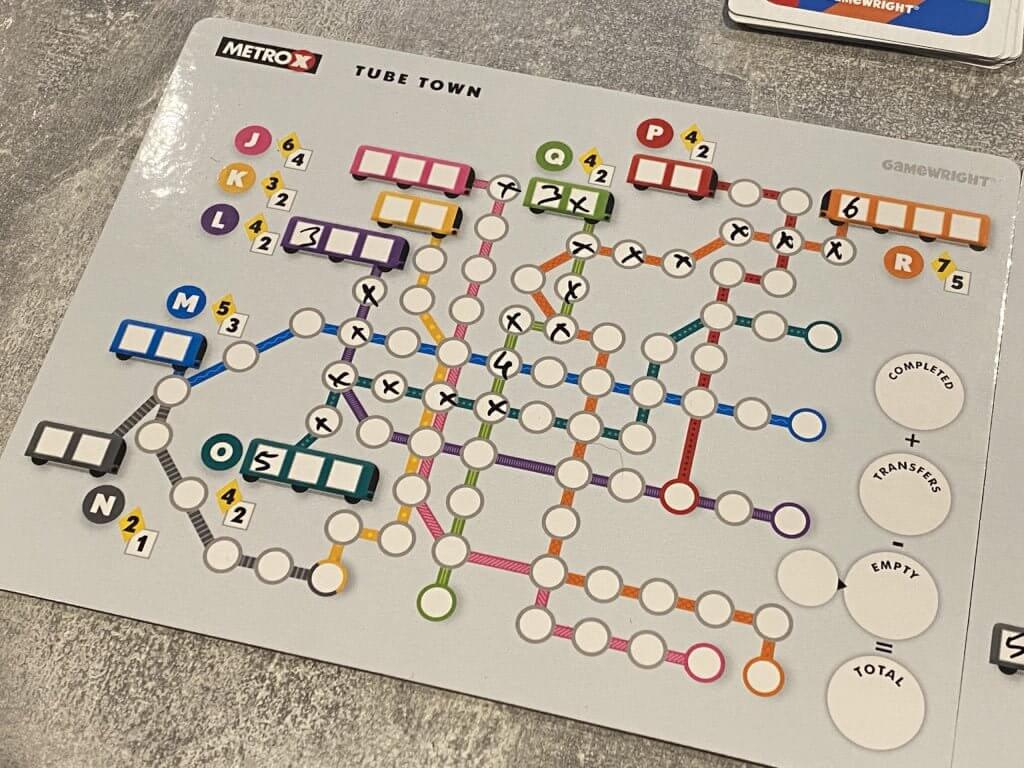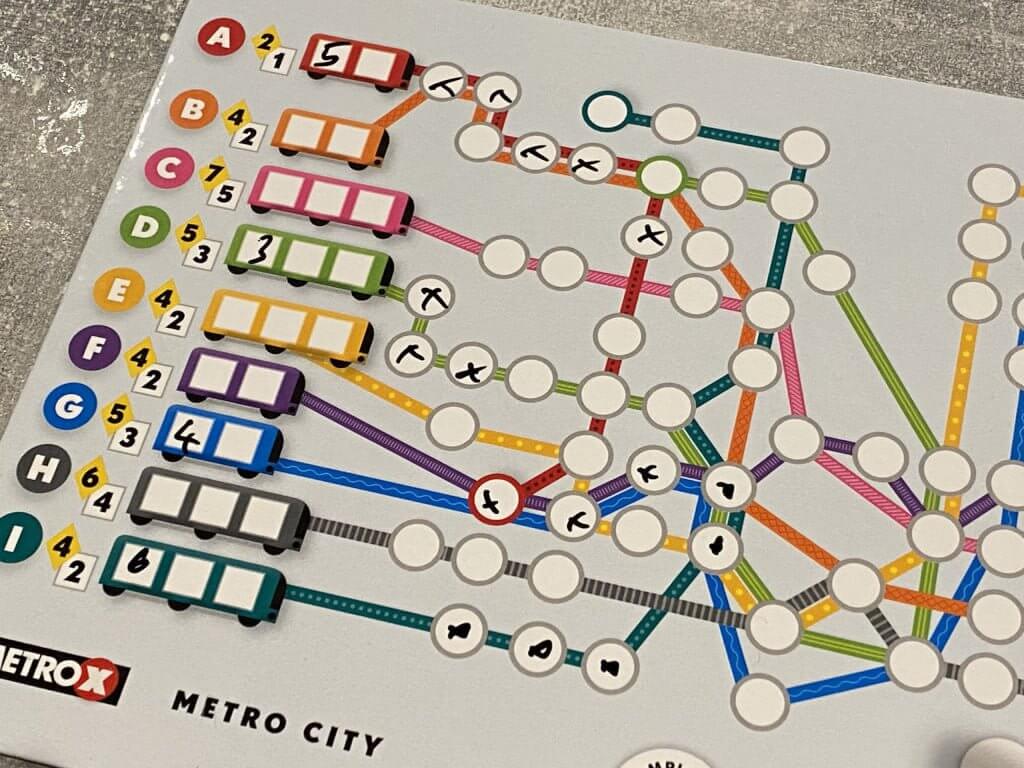Metro X takes you on a Draw-and-Write tour of the Underground
Although I’ve only played a few personally, the Roll-and-Write genre is becoming ever more popular among board gamers. Played on a printed sheet with nothing but a pen and a few dice (in most cases) these games are fast and filled with smart puzzles. Metro X, from Gamewright, twists the standard formula by using a deck of cards instead of dice to drive the action.
Metro X simply could not be simpler to set up and get cracking with, although I will come back to a couple of fiddly rules later. Each of up to six players simply takes one of the wipe-clean boards and a matching pen. The players all agree on one side or the other, and then shuffle the deck of sixteen cards.
Any player can draw the first card, and on it, they will see either a number, an X or one of several keywords. Now, all players (not just the one who drew the card) will make a mark on their board depending on the card. For numbers, the player will write the number in a free train window, and will then mark the same number of spaces along the matching train track, beginning with the first free space and ending either when the correct number is used, or when another marked space is encountered.

Other cards allow for unique actions, albeit they all involve writing in windows and marking spaces along the lines. One card allows the players to fill in any space, whilst a Transfer card allows the players to trace down any of their lines until they come to an intersection (where several lines cross.) At this point, they will multiply the number of lines that meet there by two, and write that number — which will become points.
When I mentioned earlier that there are some fiddly rules, they mostly come in around these special cards. A few games quickly reveal how things should actually play, but when you read it from the manual the nuances don’t leap off the page. I can’t quite put my finger on it, but there’s something quite jarring about how it’s explained.
In any case, Metro X is not hard to learn once you’re actually in the game, and like most of the roll-and-write games that I’ve played, it has a very puzzly kind of feel. Sadly, there’s also a programmatic element to it — if you know the most efficient way to fill in the train lines based on which cards are drawn, then you’ll simply do better.

Each train carriage can take between two and four marks, and unsurprisingly some train lines are longer than others. At this point I realise that I haven’t actually explained that in addition to the Transfer cards that I’ve just mentioned, the main way of scoring points is to complete entire train lines by filling in all the spaces.
So, Metro X has a racing element as players attempt to complete their tracks, and it has a mathematical puzzle that can be solved by smart players — whether that’s instant if you have the right kind of brain for it, or over the course of many games and matched with a good memory.
Part of me thinks this might have been solved by having each of the six player-boards use slightly different layouts for each of the two sides (whilst still retaining what makes the two cities unique). I think I’d also like to see a system where the players don’t all access the same card to dictate their play — after all, it’s possible for two players to make precisely the same moves on precisely the same boards.

Whilst this review might seem slightly negative, I do think Metro X is fairly good fun. It’s fast, accessible and for casual players, it bridges the gap between the kind of Sudoku puzzles that they’ll feel very at home with and brings them into lightweight gaming without making it too obvious.
For more experienced or competitive gamers however, I don’t love the fact that the boards are all the same and the same card will drive every players actions. This, for me, will lead to players learning the game off by heart and taking the fun out of it, and it straight up reduces the replayability.
Overall then, Metro X is a cheap, fun, lightweight puzzle game that has lovely components in the box and support six players (fairly rare) at a low price. On the downside, it has questionable longevity and appeal for frequent gamers, but it’s a nice overall alternative to the standard roll-and-write.
You can grab a copy of Metro X on Amazon.
Love both video games and board games? Here’s our list of some fantastic crossover games.
Comments are closed.